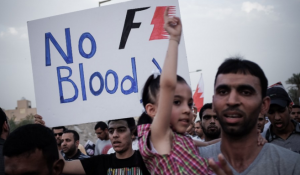Bahrain was one of the first states in the Gulf to discover oil and to build a refinery; as such, it benefited from oil wealth before most of its neighbours.
Bahrain never reached the levels of production that Kuwait or Saudi Arabia did and has been forced to diversify its economy.
The country has been headed by the Khalifa family since 1783. From 1861 until independence in 1971, Bahrain was sort of a British protectorate. Since its independence it has had close links with the United States, and is the home to the US Navy’s Fifth Fleet.
The king is the supreme authority in the country and member of the ruling family that hold the main political and military posts. There are long-running tensions between Bahrain’s Sunnis and the Shia Muslim majority. On occasion, these have spilled over into civil unrest. The royal family is Sunni.
In 2001 Bahrainis strongly backed the proposal to turn the country into a constitutional monarchy with an elected parliament and an independent judiciary. The first poll in nearly 30 years was held in 2002 for a 40-member parliament, the Council of Deputies, which included a dozen Shia MPs.
In early 2011 the government violently crushed protests by demonstrators with the help of the Saudi military. The protestors demanded a greater say in government and an end to what they perceived as a systematic discrimination against them.
Thousands of demonstrators gathered for several days in the centre of Manama, inspired by the popular uprisings which toppled the leaders of Tunisia and Egypt. Several people were killed in clashes with security forces.
Analysts say that the ruling Khalifa family is split on how to best respond to the calls for dialogue and power sharing.
Prime Minister Sheikh Khalifa bin Salman al-Khalifa is a hardliner who is reluctant to make any concessions while crown Prince Salman al-Khalifa, is seen as a moderate, and the opposition is keen that he should be involved in any dialogue.
In March 2013 he was appointed deputy prime minister by King Hamad, giving rise to speculation that the king might be prepared to meet some of the opposition’s demands.
However, the national dialogue launched in February 2013 ended in stalemate, and was suspended in January 2014.

